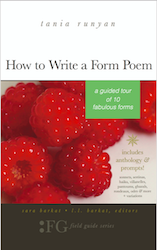Poet-a-Day: Meet John Poch
John Poch is a smart, prolific poet whom I’ve had the privilege of getting to know over the years at various writing conferences and workshops. He’s also a talented photographer. (Follow him on Instagram @pochphoto and marvel at his beautiful local landscape and family.) I am thrilled to have the opportunity to reprint one of his poems in How to Write a Form Poem. Here are the first three stanzas from “Echo,” Poch’s villanelle on the mythological character of the same name.
You can read the poem in its entirety in Fix Quiet, one of Poch’s poetry collections, and, of course, in How to Write a Form Poem.
Echo (an excerpt)
I couldn’t understand the thing he told me.
He said he couldn’t make it any clearer:
I’d rather die of thirst than have you hold me.
Hold me, I said. His elegance consoled me,
and his refusal made him all the dearer.
I couldn’t understand. The thing he told me,
twice (how could anyone repeat it?), bowled me
over. I put it to myself, and queerer:
I’d rather die of thirst than have you hold me? …
—John Poch
Here’s what the poet has to say about his villanelle:
Tania Runyan (TR): Tell me a little about the origin story of “Echo.”
John Poch (JP): Traditional forms have certain structural characteristics that are undeniable, and you can work with some of those structures to make a poem. The repeating lines of the villanelle require that you
1. Have something (two things) worth repeating, and
2. Vary that repetition as to avoid boredom.
The greatest villanelle ever written, Dylan Thomas’s poem, has two lines emotionally and intellectually worth repeating, as they are rebelling against the death of his father. No one would question why those lines are worth repeating. And they vary well, as they move along, developing the nature of father and son and the idea of what it is to be mortal “men”. I remember beginning my own poem, “Echo,” with the idea that she loves to hear herself (her fatal flaw). When I realized that her beloved Narcissus has as his fatal flaw his love of seeing himself and also not listening, I knew I had the stuff of a villanelle.
TR: Why did you decide to write the poem as a villanelle? Or did the form “cause” the poem to happen?
JP: The form caused this poem to happen. I consciously set out to write this poem as a villanelle because I thought this line worth repeating: “I couldn’t understand the thing he told me.”
TR: What do you hope poets can learn from a book like How to Write a Form Poem?
JP: I would hope that readers would realize that forms free more than they restrict. If you have a pattern, you can do many things to vary within the formal confines of that pattern. And formal poetry patterns exist because they work. To merely write a poem about your feelings is to ignore the good that can happen with the language of poetry.
About John Poch
John Poch has published six full-length poetry collections, most recently Texases (WordFarm 2019). He teaches in the English Department at Texas Tech University. His poems have been published in Paris Review, Image, Agni, and many other journals.
Photo by ~jar{}, Creative Commons, via Flickr. Post by Tania Runyan.
Browse more Poet-a-Day
Browse 50 States of Generosity
Check out The Yellow Wall-paper Graphic Novel
BUY ‘HOW TO WRITE A FORM POEM’ NOW!
- Flowers of California: California Poppy - December 8, 2022
- Flowers of California: Lily of the Nile - October 13, 2022
- Flowers of California: Crape Myrtle - October 5, 2022



L.L. Barkat says
I like the idea of landing on a phrase that feels “worth repeating” and then exploring its worth in a villanelle.
This weekend, one of my daughters said something so profound and concise I told her to save the phrase. Maybe I’ll suggest a villanelle! 🙂